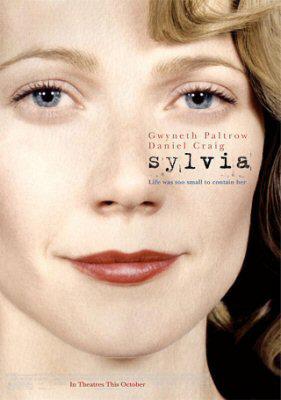Film and DVD Review
Sylvia (2003)
Music composed by Gabriel Yared Directed by Christine Jeffs
DVD available on Alliance Atlantis, region 1 only
Film currently on cinema release in the UK
Running time: 1 hour 54 minutes

See also Ian Lace's review of the soundtrack album.
Christine Jeffs' Sylvia was the closing film at last years' London Film Festival – a peculiarly self-indulgent honour given that its release this January in UK cinemas was followed by a string of bad reviews. Fortunately, someone at the LFF had done their homework, if not being quite the balanced biopic it might have been, is not as bad as the slating it has subsequently been given might imply. In fact, it is rather a good film, albeit it one with some major flaws.
The flaws are, in the case of the casting, quite significant. Gwyneth Paltrow is good as Plath although at times she herself seems less than convinced by Jeffs' wider motives (this is, after all, one of Hollywood's most intuitive actresses). She is convincing in Plath's moments of despair but nowhere does she seem to convey the passion that was so symptomatic of this great writer. The moment she meets Hughes, for example, and bites his cheek - in reality she drew blood, in the film seemingly not – is less a meeting of explosive sexuality than it probably was. Daniel Craig as Ted Hughes struggles with his accent, but more damagingly Craig just doesn't cut the mustard as this smouldering Leviathan of mid-Twentieth Century letters; he neither looks nor acts the part and he, too, seems to have some difficulty with Jeffs' characterisation of his role. But what is really missing is an on-screen chemistry between the two leads and in a film which is quintessentially about destructive love this is fatal.
This is Jeffs' first major film and she has fallen into the trap of choosing subjects that, at this stage of her career, are clearly beyond her talents. It is hardly surprising that the Hughes Estate refused any kind of co-operation – or indeed that both Plath's publishers and Hughes' publishers, in both cases Faber & Faber – refused permission to use their works. The underlying motives are feminist and recount a version of events that has subsequently been, if not overwritten, then revised. Plath's seeming innocence to events unfolding, and her subsequent vulnerability, are contrasted with the barely concealed Machiavellian treatment given out to Hughes, who is projected as not only cruel but manipulative. Jeffs' directorial failure is to be overwhelmed by her principal subject and take a slant on events that simply recounts some clear untruths.
Ironically, Jared Harris, in a film stealing performance as the writer and critic A. Alvarez, provides just the kind of balanced performance that is largely missing elsewhere. Had Jeffs reached for a copy of Alvarez' book, The Savage God, one of the most sublime studies of suicide ever written, and read just the long opening prologue – on Plath's suicide - she would have had a much greater understanding of what this film should have been about.
But Sylvia does have some redeeming features. Over its one-hour and 50 odd minutes it moves with an elasticity of pace that is refreshing. There are also a number of intensely filmed interludes that give some hints as to this director's flair for the dramatic. The dinner scene in Devon where Hughes and Plath dine with David and Assia Wevill (Andrew Havill and Amira Casar) owes much to Albee's Who's Afraid of Virginia Woolf (and specifically Mike Nicholl's film of the play). At the time Hughes was not involved with Assia Wevill but Jeffs succeeds in ratcheting-up the tension by having them silhouetted through frosted glass causing Plath to at least imagine they were having an affair. This is such a vivid contrast to the actual scene where Hughes and Wevill do consummate their affair, which is projected in a sterile and cold fashion. Also well done is the final scene where Plath decides on suicide (having been told by Hughes that Wevill is expecting his child). Here Paltrow is exemplary and moving and in a moment that finally (although by this stage too late) suggests some humanity in Hughes we see him break down.
Also exceptional is Lebanese composer Gabriel Yared's score. In this film he has found a genuinely musical voice that belies some of his previous work's unfertile imagination. Perhaps because of the literary subject matter of the film the score itself is poetic with the use of solo instruments against the subtle orchestration often recalling the human voice. If it's overall tone seems reminiscent of Finzi (notably in the slow movement of that composer's Cello Concerto) that seems appropriate for a film that is more mid-20th century British than it is American. It is a score that is both haunting and virile, though again (perhaps at Jeffs' intervention) it seems to negate the passion that was an essential part of this doomed relationship.
The DVD itself, whilst satisfactory to watch in its widescreen format, and with superbly atmospheric digital surround sound, is poor in every other respect. There is no director commentary (I'd have thought an absolute minimum for any DVD release these days) and no other extras whatsoever. Sylvia is certainly not the film it might have been, its unevenness a distraction to some of its achievements. We still have to wait for the one biopic of this extraordinarily tragic story to do its subjects full justice.
Marc Bridle
Film rating:
21/2
DVD rating:1/2
Return to Index